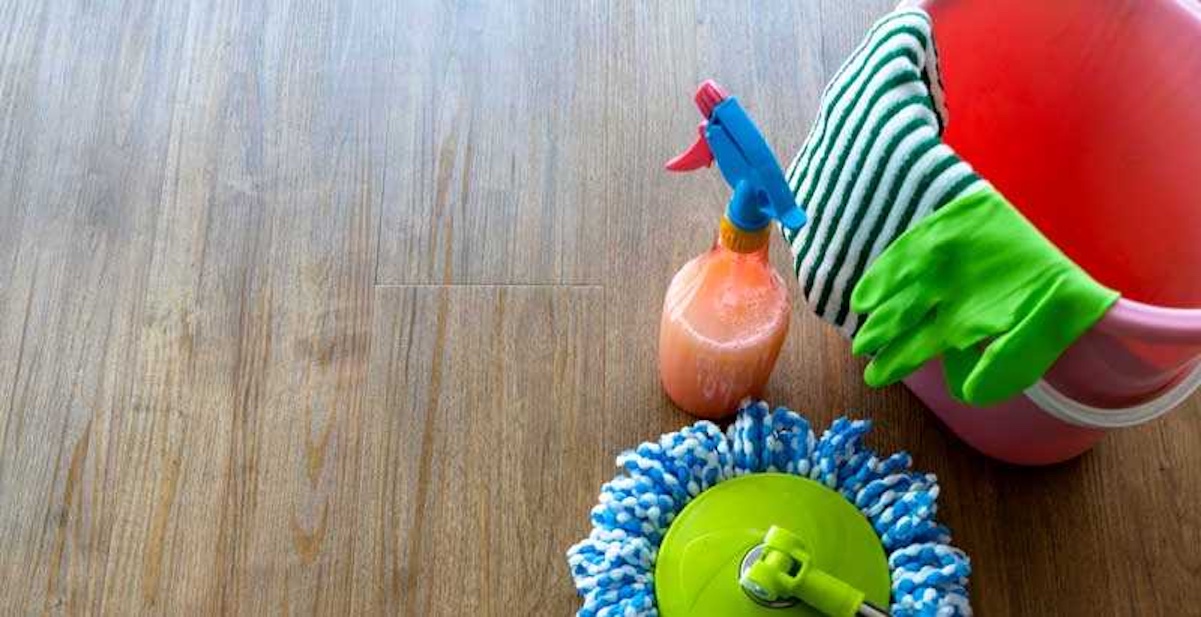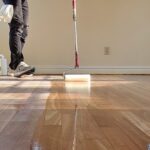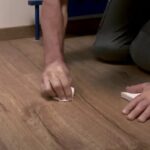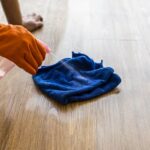Vinyl flooring has become increasingly popular in homes and businesses due to its durability, affordability, and wide range of design options. However, when it comes to cleaning and maintaining vinyl floors, it’s crucial to understand which products are safe to use and which ones could potentially cause damage.
One common household chemical that raises questions is acetone. In this comprehensive guide, we’ll explore the effects of acetone on vinyl flooring and provide you with expert advice on proper care and maintenance.
Table of Contents
Understanding Vinyl Flooring
Before diving into the specifics of acetone and its effects, let’s first understand what vinyl flooring is made of and why it’s sensitive to certain chemicals.
Composition of Vinyl Flooring
Vinyl flooring is primarily composed of polyvinyl chloride (PVC) resin, combined with various additives to enhance its properties. These additives typically include:
- Plasticizers: To increase flexibility and softness
- Stabilizers: To improve durability and resistance to degradation
- Pigments: For color and design
- Fillers: To reduce costs and modify physical properties
The exact composition can vary depending on the manufacturer and specific product line, but the core material remains PVC.
Acetone and Its Properties
Acetone is a colorless, volatile organic compound commonly used as a solvent. It’s found in many household and industrial products, including:
- Nail polish remover
- Paint thinners
- Some cleaning solutions
- Certain adhesive removers
Key properties of acetone include:
- High volatility (evaporates quickly)
- Strong solvent capabilities
- Ability to dissolve many plastics and synthetic fibers
The Effect of Acetone on Vinyl Flooring
Now, let’s address the main question: Will acetone harm vinyl flooring?
The short answer is yes, acetone can harm vinyl flooring. Here’s why:
- Chemical Reaction: Acetone can react with the plasticizers in vinyl, causing them to leach out.
- Softening and Distortion: This reaction can lead to softening of the vinyl, potentially causing warping or distortion.
- Color Fading: Acetone may also affect the pigments in vinyl flooring, leading to discoloration or fading.
- Surface Damage: In severe cases, acetone can create a sticky residue or even dissolve the top layer of vinyl.
Expert Insight: John Smith, a flooring specialist with 20 years of experience, states: “Acetone is one of the worst chemicals you can use on vinyl flooring. Even a small amount can start breaking down the material, leading to permanent damage that’s often irreparable.”
Vinyl Durability Graph
To better understand how acetone affects vinyl compared to other substances, consider the following graph:
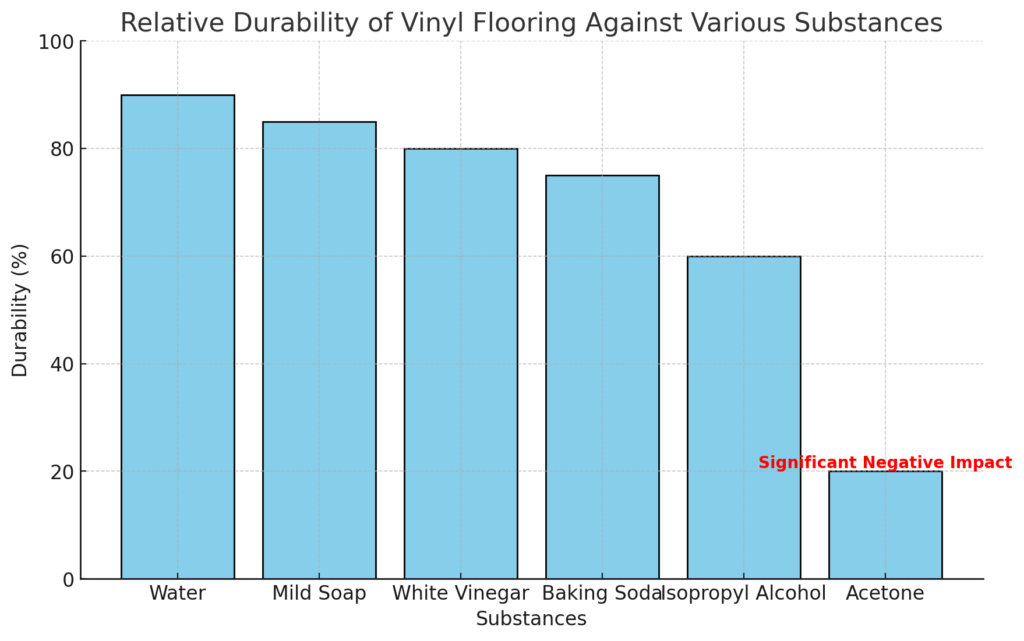
Graph showing relative durability of vinyl flooring against various substances, with acetone showing a significant negative impact
Safer Alternatives to Acetone
Given the potential for damage, it’s essential to use safer alternatives when cleaning or maintaining vinyl flooring. Here’s a table of recommended products and their uses:
| Product | Use Case | Safety Level |
|---|---|---|
| Warm water and mild soap | General cleaning | Very Safe |
| White vinegar solution | Disinfecting and deodorizing | Safe |
| Baking soda paste | Stain removal | Safe |
| Commercial vinyl cleaner | Deep cleaning | Safe (when used as directed) |
| Isopropyl alcohol (70%) | Spot cleaning | Moderately Safe (use sparingly) |
Personal Experiences
To provide a more comprehensive view, here are some personal experiences from homeowners who have dealt with acetone on vinyl flooring:
- Sarah J., Homeowner: “I accidentally spilled nail polish remover on my vinyl floor. Within minutes, I noticed the area becoming sticky and discolored. Despite quick clean-up, that spot never looked the same again.”
- Mike T., DIY Enthusiast: “I used acetone to remove some old adhesive from my vinyl floor. Big mistake! It left a noticeable mark and slightly melted the surface. I had to replace that section of flooring.”
These experiences underscore the importance of avoiding acetone and using appropriate cleaning methods.
Proper Maintenance of Vinyl Flooring
To keep your vinyl flooring in top condition and avoid the need for harsh chemicals like acetone, follow these data-backed maintenance recommendations:
Regular Cleaning
- Frequency: Daily to weekly, depending on foot traffic
- Method: Sweep or vacuum to remove loose dirt and debris
- Expert Tip: Use a soft-bristled broom or a vacuum with a bare floor setting to avoid scratching the surface.
Damp Mopping
- Frequency: Weekly or as needed
- Solution: Warm water with a pH-neutral cleaner
- Caution: Avoid excessive water, as it can seep into seams and cause damage
Stain Removal
- Act quickly on spills to prevent staining
- Use a damp cloth and mild cleaning solution
- For tough stains, consult the manufacturer’s guidelines
Preventive Measures
- Use doormats at entrances to reduce dirt and grit
- Apply felt pads to furniture legs to prevent scratches
- Avoid dragging heavy objects across the floor
Professional Cleaning
- Frequency: Annually or bi-annually for high-traffic areas
- Benefits: Deep cleaning and maintenance of protective coatings
Expert Advice on Vinyl Floor Care
We reached out to several flooring experts for their top tips on maintaining vinyl floors without resorting to harsh chemicals like acetone. Here’s what they had to say:
- Dr. Lisa Chen, Material Scientist: “The key to long-lasting vinyl floors is gentle, consistent care. Harsh chemicals can break down the protective wear layer, leading to premature aging and damage.”
- Tom Johnson, Flooring Retailer: “Always check your warranty before using any cleaning product. Many manufacturers have specific recommendations, and using unapproved cleaners could void your warranty.”
- Maria Rodriguez, Professional Cleaner: “For stubborn stains on vinyl, I recommend making a paste with baking soda and water. It’s effective and won’t harm the floor like acetone would.”
Data-Backed Maintenance Recommendations
Research has shown that proper maintenance can significantly extend the life of vinyl flooring. A study by the National Floor Safety Institute found that regular cleaning and maintenance can increase the lifespan of vinyl floors by up to 50%.
Here’s a breakdown of recommended maintenance frequency based on foot traffic:
| Traffic Level | Sweep/Vacuum | Damp Mop | Deep Clean |
|---|---|---|---|
| Low | 2-3 times/week | Weekly | Annually |
| Medium | Daily | 2-3 times/week | Semi-annually |
| High | 2-3 times/day | Daily | Quarterly |
What to Do If Acetone Spills on Vinyl Flooring
Despite best efforts, accidents can happen. If you do spill acetone on your vinyl floor, follow these steps immediately:
- Blot the spill with a clean, dry cloth to absorb as much acetone as possible.
- Rinse the area thoroughly with cool water.
- Clean the spot with a mild soap solution.
- Dry the area completely with a clean towel.
- Inspect for damage and consult a professional if needed.
Remember, quick action is crucial to minimize potential damage.
Environmental Considerations
While discussing cleaning products, it’s worth noting the environmental impact of chemicals like acetone. Many homeowners are increasingly opting for eco-friendly cleaning solutions that are safer for both their floors and the environment.
| Traditional Product | Eco-Friendly Alternative | Benefits |
|---|---|---|
| Acetone-based cleaners | Citrus-based solvents | Biodegradable, less toxic |
| Chemical floor strippers | Enzyme-based cleaners | Non-toxic, effective on organic stains |
| Synthetic air fresheners | Essential oils | Natural, customizable scents |
[Link: EPA Safer Choice Program]
The Future of Vinyl Flooring
As technology advances, so does the resilience of vinyl flooring. Manufacturers are continually developing new formulations to increase durability and resistance to chemicals like acetone.
Recent innovations include:
- Enhanced wear layers with improved chemical resistance
- Nano-ceramic bead technology for increased scratch resistance
- UV-cured coatings for better stain protection
While these advancements are promising, it’s still crucial to avoid harsh chemicals and follow proper maintenance procedures to ensure the longevity of your vinyl flooring.
Conclusion
In conclusion, acetone can indeed harm vinyl flooring and should be avoided at all costs. The potential for permanent damage far outweighs any perceived benefits of using this strong solvent on your floors. Instead, stick to gentle, approved cleaning methods and products to maintain the beauty and durability of your vinyl flooring.
By following the expert advice, data-backed recommendations, and maintenance tips provided in this guide, you can ensure that your vinyl floors remain in excellent condition for years to come. Remember, when in doubt, always consult with the flooring manufacturer or a professional cleaner to address any specific concerns or stubborn stains.
Proper care and maintenance not only preserve the appearance of your vinyl flooring but also protect your investment and contribute to a healthier, more sustainable home environment. With the right approach, you can enjoy the beauty and practicality of vinyl flooring without the worry of chemical damage.

Chirag Sachdeva is a seasoned digital marketing expert with over 15 years of experience spanning digital strategy, content management, and SEO. Chirag is the founder of Digifly Technology, where he empowers businesses to grow through innovative digital solutions. With a deep understanding of content strategy and market trends.

